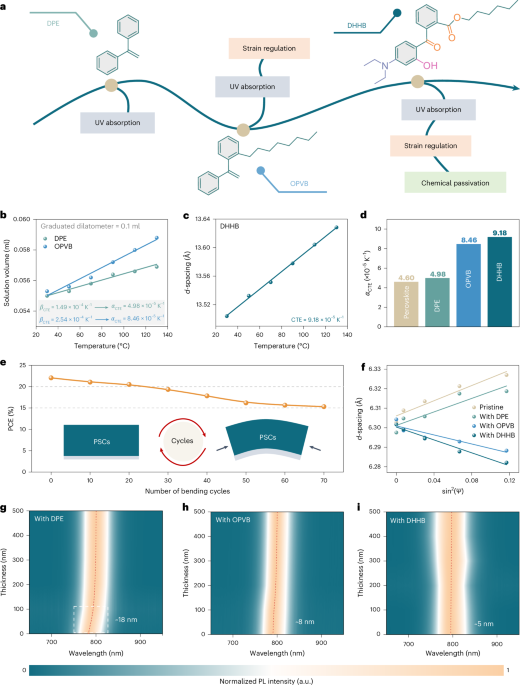Chen, H. et al. Improved charge extraction in inverted perovskite solar cells with dual-site-binding ligands. Science 384, 189–193 (2024).
Park, J. et al. Controlled growth of perovskite layers with volatile alkylammonium chlorides. Nature 616, 724–730 (2023).
Zhao, Y. et al. Inactive (PbI2)2RbCl stabilizes perovskite films for efficient solar cells. Science 377, 531–534 (2022).
Liu, S. et al. Buried interface molecular hybrid for inverted perovskite solar cells. Nature 632, 536–542 (2024).
Gao, D. et al. High-efficiency perovskite solar cells enabled by suppressing intermolecular aggregation in hole-selective contacts. Nat. Photon. 19, 1070–1077 (2025).
Shen, Y. et al. Strain regulation retards natural operation decay of perovskite solar cells. Nature 635, 882–889 (2024).
Tan, Q. et al. Inverted perovskite solar cells using dimethylacridine-based dopants. Nature 620, 545–551 (2023).
Guo, R. et al. Degradation mechanisms of perovskite solar cells under vacuum and one atmosphere of nitrogen. Nat. Energy 6, 977–986 (2021).
Jiang, Y. et al. Mitigation of vacuum and illumination-induced degradation in perovskite solar cells by structure engineering. Joule 4, 1087–1103 (2020).
Li, N. et al. Towards commercialization: the operational stability of perovskite solar cells. Chem. Soc. Rev. 49, 8235–8286 (2020).
Jiang, Q. et al. Towards linking lab and field lifetimes of perovskite solar cells. Nature 623, 313–318 (2023).
Meng, H. et al. Inhibition of halide oxidation and deprotonation of organic cations with dimethylammonium formate for air-processed p–i–n perovskite solar cells. Nat. Energy 9, 536–547 (2024).
Ma, C. et al. Unveiling facet-dependent degradation and facet engineering for stable perovskite solar cells. Science 379, 173–178 (2023).
Zhou, J. et al. Modulation of perovskite degradation with multiple-barrier for light-heat stable perovskite solar cells. Nat. Commun. 14, 6120 (2023).
Hartono, N. T. P. et al. Stability follows efficiency based on the analysis of a large perovskite solar cells ageing dataset. Nat. Commun. 14, 4869 (2023).
Cheng, W. et al. Molecular bridging of buried interface flattens grain boundary grooves and imparts stress relaxation for performance enhancement and UV stability in perovskite solar cells. Adv. Energy Mater. 15, 2501296 (2025).
Wang, L. et al. A Eu3+–Eu2+ ion redox shuttle imparts operational durability to Pb–I perovskite solar cells. Science 363, 265–270 (2019).
Steele, J. A. et al. Thermal unequilibrium of strained black CsPbI3 thin films. Science 365, 679–684 (2019).
Zheng, X. et al. Improved phase stability of formamidinium lead triiodide perovskite by strain relaxation. ACS Energy Lett. 1, 1014–1020 (2016).
Xiong, Q. et al. Managed spatial strain uniformity for efficient perovskite photovoltaics enables minimized energy deficit. Joule 8, 817–834 (2024).
Liu, D. et al. Strain analysis and engineering in halide perovskite photovoltaics. Nat. Mater. 20, 1337–1346 (2021).
Xue, D.-J. et al. Regulating strain in perovskite thin films through charge-transport layers. Nat. Commun. 11, 1514 (2020).
Luo, C. et al. Engineering the buried interface in perovskite solar cells via lattice-matched electron transport layer. Nat. Photon. 17, 856–864 (2023).
Zhao, J. et al. Strained hybrid perovskite thin films and their impact on the intrinsic stability of perovskite solar cells. Sci. Adv. 3, eaao5616 (2017).
Jones, T. W. et al. Lattice strain causes non-radiative losses in halide perovskites. Energy Environ. Sci. 12, 596–606 (2019).
Nie, R. et al. Enhanced coordination interaction with multi-site binding ligands for efficient and stable perovskite solar cells. Nat. Commun. 16, 6438 (2025).
Li, C. et al. Rational design of Lewis base molecules for stable and efficient inverted perovskite solar cells. Science 379, 690–694 (2023).
Yang, T. et al. One-stone-for-two-birds strategy to attain beyond 25% perovskite solar cells. Nat. Commun. 14, 839 (2023).
Pei, F. et al. Inhibiting defect passivation failure in perovskite for perovskite/Cu (In,Ga)Se2 monolithic tandem solar cells with certified efficiency 27.35%. Nat. Energy 10, 824–835 (2025).
Wang, S. et al. Fluorinated isopropanol for improved defect passivation and reproducibility in perovskite solar cells. Nat. Energy 10, 1074–1083 (2025).
Xu, H. et al. Metastable interphase induced pre-strain compensation enables efficient and stable perovskite solar cells. Energy Environ. Sci. 18, 246–255 (2025).
Iwai, Y. et al. Giant anisotropic thermal expansion of copper-cyanido flat layers with flexible copper nodes. Chem. Commun. 60, 6512–6515 (2024).
Rolston, N. et al. Engineering stress in perovskite solar cells to improve stability. Adv. Energy Mater. 8, 1802139 (2018).
Wang, H. et al. Interfacial residual stress relaxation in perovskite solar cells with improved stability. Adv. Mater. 31, 1904408 (2019).
Meng, W. et al. Revealing the strain-associated physical mechanisms impacting the performance and stability of perovskite solar cells. Joule 6, 458–475 (2022).
Sun, X. et al. In-plane compressive strain stabilized formamidinium-based perovskite. Matter 8, 101920 (2025).
Ju, S.-Y. et al. Enhanced phase stability of compressive strain-induced perovskite crystals. ACS Appl. Mater. Interfaces 14, 39996–40004 (2022).
Wang, S. et al. Enhanced passivation durability in perovskite solar cells via concentration-independent passivators. Joule 8, 1105–1119 (2024).
Yuan, Y. et al. Ion migration in organometal trihalide perovskite and its impact on photovoltaic efficiency and stability. Acc. Chem. Res. 49, 286–293 (2016).
Brennan, M. C. et al. Light-induced anion phase segregation in mixed halide perovskites. ACS Energy Lett. 3, 204–213 (2018).
Suo, J. et al. Multifunctional sulfonium-based treatment for perovskite solar cells with less than 1% efficiency loss over 4,500-h operational stability tests. Nat. Energy 9, 172–183 (2024).
Khenkin, M. et al. Light cycling as a key to understanding the outdoor behaviour of perovskite solar cells. Energy Environ. Sci. 17, 602–610 (2024).
Li, G. et al. Highly efficient p–i–n perovskite solar cells that endure temperature variations. Science 379, 399–403 (2023).
Rolston, N. et al. Comment on ‘Light-induced lattice expansion leads to high-efficiency perovskite solar cells’. Science 368, eaay8691 (2020).
Tsai, H. et al. Light-induced lattice expansion leads to high-efficiency perovskite solar cells. Science 360, 67–70 (2018).
